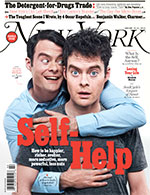 In New York Magazine‘s new self-help issue, journalist Kathryn Schulz examines how we can improve ourselves and why it’s so damn hard. You might know you shouldn’t watch the next episode of that serial television show on Netflix (those new countdowns don’t help) or eat that deep-fried, bacon-wrapped Twinkie (or five), but that doesn’t mean you won’t! Exploring this dissonance between the prudent, “better” you and the troublemaking mortal sinner leads Schulz to grapple with the thorny question, “Can self-help work if we have no idea how a self works?”
In New York Magazine‘s new self-help issue, journalist Kathryn Schulz examines how we can improve ourselves and why it’s so damn hard. You might know you shouldn’t watch the next episode of that serial television show on Netflix (those new countdowns don’t help) or eat that deep-fried, bacon-wrapped Twinkie (or five), but that doesn’t mean you won’t! Exploring this dissonance between the prudent, “better” you and the troublemaking mortal sinner leads Schulz to grapple with the thorny question, “Can self-help work if we have no idea how a self works?”
Shulz’s article, “The Self in Self-Help,” attempts to parse out the self that begs for improvement and the better self that makes it move—or doesn’t. In doing so, Schulz uncovers the conceptual motor that makes the self-help dynamic work. She calls it the master theory of self-help, which requires at least two selves: “one that needs a kick in the ass and one that is capable of kicking.”
All self-help literature offers is a kind of metaphysical power of attorney for our putative better halves. But if you identify with the above-mentioned Oreo-eater or healthy-relationship saboteur or procrastinator, you yourself are evidence that this is a nonsolution. If giving your better half executive control by fiat could change your life, sales of self-help material would plummet overnight. It is a somewhat beautiful fact that the underlying theory of the self-help industry is contradicted by the self-help industry’s existence.
Toward the end of her essay, Schulz points to both the virtue and contradiction within Buddhist self-help literature:
God knows we all need more help, but possibly we need less self. That has long been the political response to the self-help movement, and it is also, in a different sense, what Buddhists believe. Curiously, Buddhism is simultaneously a burgeoning influence on the Western self-help movement and entirely at odds with it: anti-self, and anti-help. It is anti-help insofar as it emphasizes radical self-acceptance and also insofar as it emphasizes remaining in the present. (Improvement, needless to say, requires you to focus on the future.) It is anti-self in that it treats thoughts as passing ephemera rather than as the valuable products of a distinct and consistent mind.
Buddhist philosophy might then act as something of a panacea to the pitfalls of the self-help movement. At the same time, however, we commonly see Buddhist practices (exercises, really) presented as mental workouts which only serve to bolster the narcissistic self-help engine.
Schulz ends on a note we can all get behind, suggesting that “perhaps we should start looking beyond the constraints of the master theory of self—and, indeed, beyond the self entirely—for ways to improve our lives.”
Read the article in its entirety here.
Thank you for subscribing to Tricycle! As a nonprofit, we depend on readers like you to keep Buddhist teachings and practices widely available.